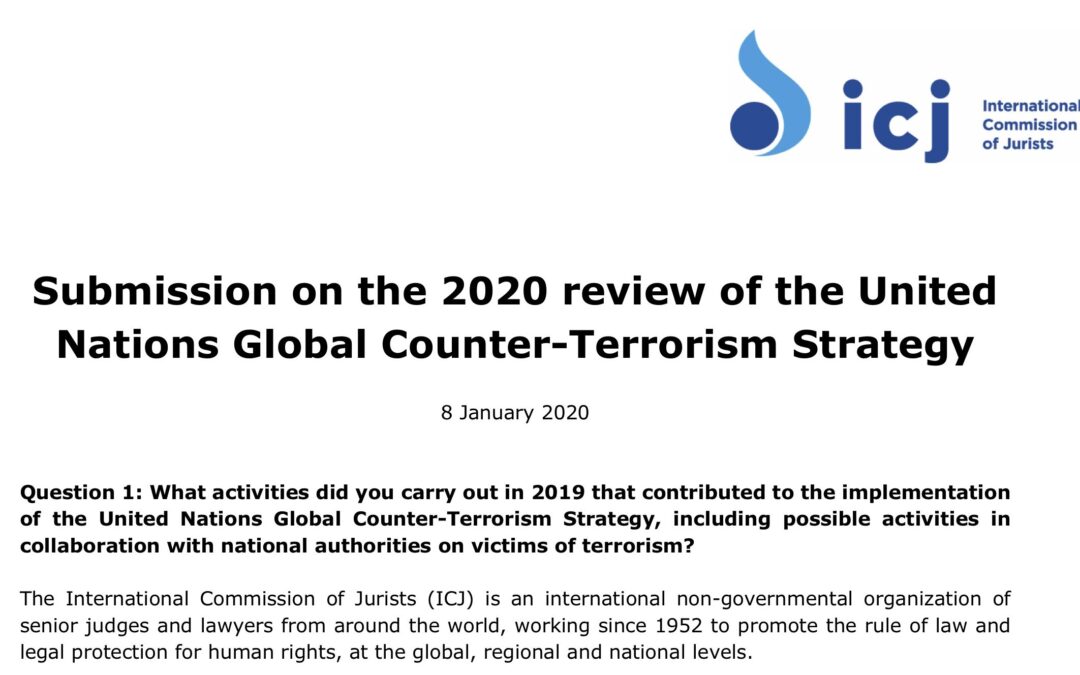
Jan 16, 2020 | Advocacy, Non-legal submissions
The ICJ has submitted information and recommendations for the upcoming review of the UN Global Counter-Terrorism Strategy, emphasising the need to strengthen the role of human rights in the framework and implementation of the strategy.
The submission was prepared in response to a call for civil society input, from the UN Office of Counter-Terrorism (UNOCT).
It summarizes recent ICJ activities relevant to implementation of the strategy, and urges among other things:
- removal of impediments to civil society participation in certain UN or other global policy-making processes;
- recognition that not only is violation of human rights in the context of countering terrorism, whether through arbitrary application or deliberate abuse, in itself unlawful and unacceptable, it also undermines the credibility and effectiveness of the struggle against terrorism;
- better recognition and implementation of the human rights of victims of terrorism;
- mainstreaming of human rights throughout the text and implementation measures for the Strategy as a whole;
- establishment of an independent human rights oversight entity within the UN counter-terrorism architecture;
- creation of a Civil Society Unit within UNOCT;
- increased resources for the UN Special Rapporteur on the promotion and protection of human rights and fundamental freedoms while countering terrorism;
- increased engagement of the UN counter-terrorism architecture with OHCHR and with other UN Special Procedures;
- benchmarks and indicators for assessing States’ compliance with human rights obligations in implementation of the GCTS.
The complete submission can be downloaded in PDF format here: UN-Advocacy-GCTStrategy-2019
For more information contact un(a)icj.org
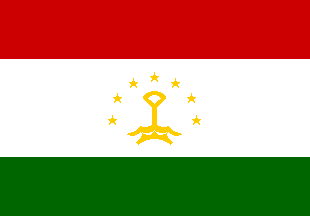
Dec 20, 2019 | Advocacy
Today, the ICJ published a compilation of cases (read the full document here) decided by the UN Human Rights Committee (HRC) concerning allegations of torture and other forms of ill-treatment (articles 7 and 10).
This compilation draws together the views of the HRC in all individual communications adjudicated on the merits in respect of Tajikistan, concerning Article 7 and Article 10 of the ICCPR from 1999 to 2019.
This compilation provides a resource for lawyers, judges, civil society and other stakeholders working to protect against torture and ill-treatment in Tajikistan. The cases in this volume demonstrate how the UN Human Rights Committee has applied the principles of its jurisprudence on torture and other ill-treatment to the particular legal and factual context of Tajikistan. These authoritative interpretations of the ICCPR by the Committee can help to inform consideration of these issues in the national courts, as well as in legislative reform and policy making.
In addition, by drawing together and analysing the facts of individual communications to the Committee from Tajikistan, this compilation also serves to identify underlying systemic issues which Tajik authorities and the national justice system fail to address. An introduction to the compilation highlight of the main issues which have been identified by the Committee in almost 20 years of its practice on Tajikistan. Several patterns regarding the actual functioning of the Tajik criminal justice system can be drawn from the Committee’s decisions. Together they represent an important evidentiary source to determine where the justice system fails in practice to protect human rights that are guaranteed by the ICCPR and often by Tajikistan law and procedure.
While the freedom from torture and other cruel, inhuman or degrading treatment or punishment under Article 7 is the central point of this review, it logically includes some reference to other relevant Articles of the ICCPR, including Article 2(3) (the right to an effective remedy for violations of the Covenant rights) Article 6 (right to life), Article 10 (conditions of detention), Article 9 (the right to liberty) and Article 14 (fair trial rights). These rights are analysed only where they are pleaded by applicants in cases also involving allegations of violations of rights under Article 7 or 10 ICCPR.
This compilation of cases is published as part of ICJ’s Global Redress and Accountability Initiative, with a view to rendering accessible the cases of the Human Rights Committee related to torture and other ill-treatment to a wide range of different actors within and engaging with the justice system. It should be useful both for independent practitioners such as lawyers, human rights defenders and civil society organizations, and for the judiciary, but also the Ministry of Justice, the Ministry of Health or the Ministry of Interior, under whose competence some of the issues may fall. The publication should be of equal interest to IGOs working in or with an interest in Tajikistan.
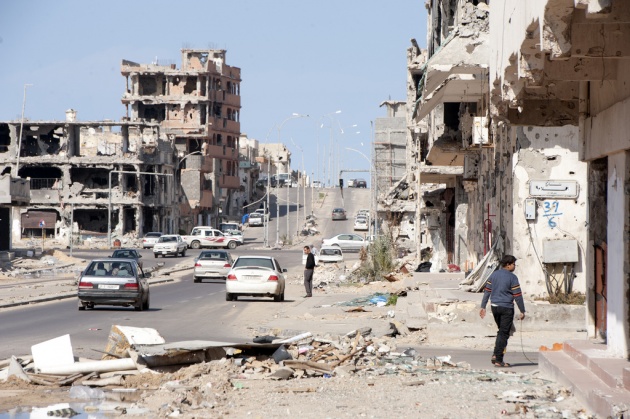
Dec 4, 2019
Today, the ICJ joined seven other non-governmental organizations calling on States to establish a Commission of Inquiry or similar mechanism for Libya at the 43rd session of the UN Human Rights Council from February to March 2020.
The mechanism should document human rights violations and abuses, identify those responsible for them, preserve evidence for use in future criminal proceedings, and publicly report on the human rights situation in the country.
“Impunity reigns in Libya and, without an overhaul of the criminal justice system, future investigations or prosecutions are unlikely to be effective,” said Said Benarbia, the ICJ’s MENA Programme Director.
“As negotiations for a ceasefire and political solution to the conflict in Libya continue, States cannot keep on ignoring accountability for the egregious human rights violations and abuses committed in the country,” he added.
In July this year, the ICJ released a report – Accountability for Serious Crimes Under International Law in Libya: An Assessment of the Criminal Justice System – which found that the legal framework in Libya does not meet international standards governing the rights to liberty and to a fair trial of detained or accused persons, or the rights of victims to a remedy and reparation.
Crimes against humanity and war crimes, committed by State and non-State actors on a widespread scale in Libya, are not penalized under domestic law at all. The definitions of crimes such as torture, enforced disappearances, extrajudicial killings and rape are also inconsistent with those under international law.
“While the International Criminal Court has jurisdiction over crimes against humanity and war crimes committed in Libya since 2011, it is not a panacea for all crimes perpetrated in the country, nor can it contribute to the development of viable institutional and legislative reforms needed for human rights and the rule of law to take root,” said Kate Vigneswaran, the ICJ’s MENA Programme Senior Legal Adviser.
At the 42nd Session of the Human Rights Council, Kate Gilmore, UN Deputy High Commissioner for Human Rights, and Ghassan Salame, Special Representative of the UN Secretary-General (SRSG) and Head of the UN Support Mission in Libya (UNSMIL), called for the establishment of an international body to investigate violations of international human rights and humanitarian law in Libya.
“States have been relegating accountability in Libya, purportedly in the interests of peace, for far too long, an approach that has continually proven to yield little in the way of a political solution or the cessation of human rights violations and abuses against the many thousands of victims. States should take heed of the SRSG and Deputy High Commissioner’s statements,” said Vigneswaran.
Other signatories to the joint letter are Amnesty International, the Cairo Institute for Human Rights Studies, the International Federation for Human Rights, Human Rights Watch, Lawyers for Justice in Libya, the Libya Platform, and the Women’s International League for Peace and Freedom.
Contact:
Said Benarbia, Director of the ICJ Middle East and North Africa Programme, t: +41-22-979-3817; e: said.benarbia(a)icj.org
Kate Vigneswaran, ICJ Senior Legal Adviser, t: +31624894664, e: kate.vigneswaran@icj.org, twitter: @KateVigneswaran
Libya-Letter to HRC-Advocacy-open letters-2019-ENG (open letter in English, PDF)
Libya-Open letter HRC_News-press release-2019-ARA (press release in Arabic, pdf)
Libya-Letter to HRC-Advocacy-open letters-2019-ARA (open letter in Arabic, PDF)
Photo credit: Image by European Commission DG ECHO
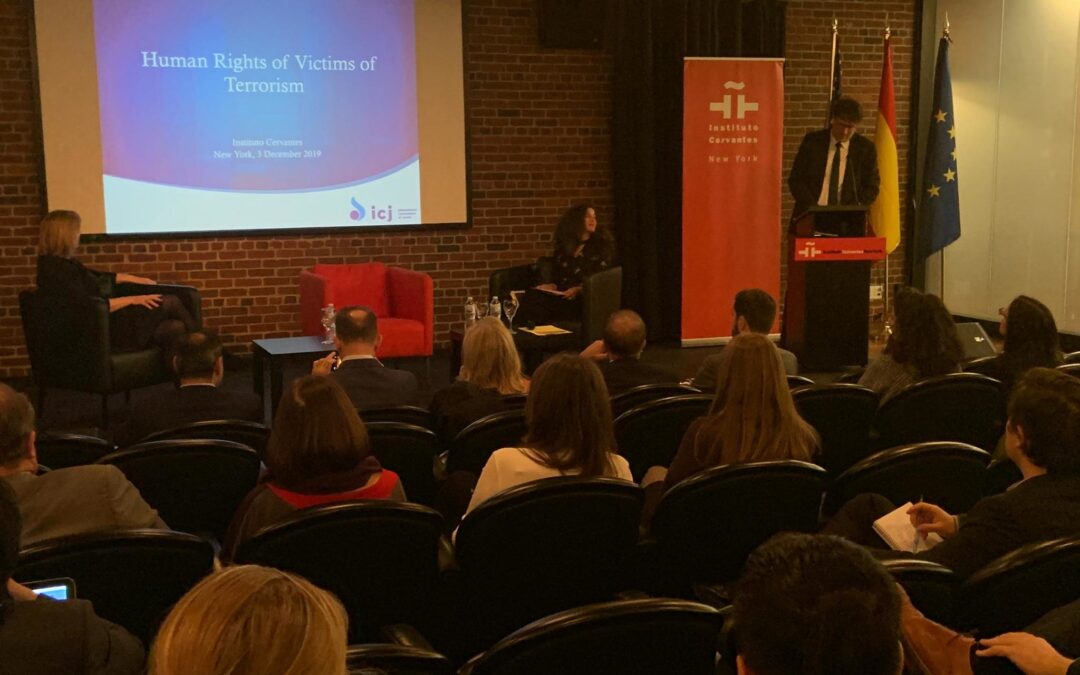
Dec 4, 2019 | News
The ICJ has highlighted the human rights of victims of terrorism in a presentation to States’ delegations to the UN in New York.
On 3 December 2019, ICJ Senior Legal Adviser Matt Pollard presented ICJ’s compilation, Human Rights of Victims of Terrorism, at an event organized by the Permanent Missions of Spain and Afghanistan and the UN Office on Counter-Terrorism (UNOCT), with participation by the UN Special Rapporteur on the promotion and protection of human rights and fundamental freedoms while countering terrorism.
In the presentation, the ICJ recognised the achievements of Spain and Afghanistan in establishing a Group of Friends of Victims of Terrorism, and in achieving consensus for a ground-breaking General Assembly resolution in June, and UNOCT’s ongoing work including the UN victims of terrorism support portal.
The ICJ also emphasised key elements such as: the essential role of victims’ associations and other civil society actors; the need to move beyond expressions of solidary to implement concrete measures of assistance; and the need for a human-rights based approach to victims of terrorism.
Among key issues, the ICJ highlighted: effective, rapid and simple access to assistance; access to justice and the truth; recognition and remembrance; avoiding exploitation and re-traumatization; preventing further attacks or violence, while respecting the rule of law and human rights; ensuring involvement of victims’ representatives in designing, implementing and assessing measures for victims; and the importance of international cooperation.
The presentation also looked forward to next steps towards concrete realization of the human rights of victims of terrorism, including through State’s responses to the call in the General Assembly resolution to develop and implement National Action Plans.
For more information contact matt.pollard(a)icj.org
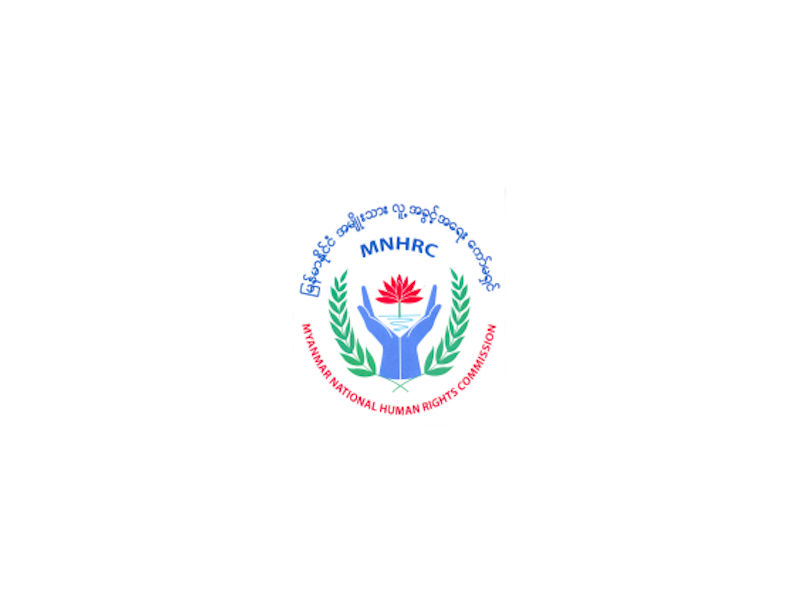
Nov 13, 2019
An opinion piece by Sean Bain, Legal Adviser, ICJ Asia-Pacific Programme, and Jenny Domino, Associate Legal Adviser, ICJ Asia-Pacific Programme.
The National League for Democracy government should use the final year of its term to carry out urgent reforms that would make the Myanmar National Human Rights Commission more effective. This would help promote respect for human rights throughout Myanmar and signal an intention to protect against violations.
Eight years after its establishment, the MNHRC remains generally ineffective, fails to meet international standards on national human rights institutions and is taken seriously by few people in society. This is largely because it lacks independence from government and has done little to address some of the most serious human rights violations in the country, particularly those involving the military. While current commissioners have taken modest steps towards reform, including through a publicly available self-assessment and a strategic plan, more robust action is required to make the MNHRC effective.
In a new legal briefing note, the International Commission of Jurists has identified four reforms that could be implemented immediately to enhance the MNHRC’s ability to protect and promote the human rights of all people in Myanmar. As a non-government organisation of human rights lawyers, the ICJ works with national human rights institutions globally, including in Myanmar. Drawing upon this experience, and on assessments by the MNHRC itself, civil society organisations and the Global Alliance of National Human Rights Institutions, the note describes how the MNHRC could better align itself with the United Nations Paris Principles, which sets standards for national human rights institutions. The MNHRC is currently graded B by the Global Alliance of National Human Rights Institutions, meaning it does not fully comply with the Paris Principles.
First, the President of Myanmar and the Commissioner Selection Board should appoint commissioners who, unlike several of the MNHRC’s incumbents, are properly qualified to promote and protect human rights. This can and should be done promptly, because the commission currently operates with only seven members, the minimum required by the 2014 MNHRC Law. Commissioners should be selected based on human rights expertise, and the overall composition ought to reflect the ethnic, religious, regional, gender and sexual diversity of society. This would boost public trust in the institution among Myanmar’s myriad minority groups. The selection process should also be undertaken transparently and with adequate consultation.
Second, the NLD-dominated Union Parliament should amend the 2014 MNHRC Law to strengthen the commission’s mandate and independence, while improving the commissioner selection process. One of several provisions requiring an overhaul is section 37, which effectively precludes the MNHRC from inquiring into potential human rights violations that are already the subject of a court proceeding. The MNHRC must be empowered to monitor such cases in order to ensure that prosecutions are carried out in a manner consistent with human rights. For instance, in a criminal case, they should be able to assess whether the defendant’s fair trial rights have been violated.
Third, as part of the current effort to amend the 2008 Constitution, the parliamentary Constitutional Amendment Committee should propose new provisions in an amended constitution that would accord the MNHRC constitutional status. The current MNHRC was created under ordinary enabling legislation, meaning it can be altered easily by subsequent law or even decree. Granting constitutional status to the MNHRC would be wise given Myanmar’s political transition: The national human rights institutions of East Timor and the Philippines – which, unlike Myanmar, have “A” ratings from the Global Alliance of National Human Rights Institutions – were established by their respective constitutions when these countries were transitioning to democracy. Constitutional protection would make it easier for the MNHRC to assert itself and preserve its independence, even against a volatile political situation.
While urgently needed, law reform alone will not boost the credibility and effectiveness of the MNHRC. An internal change in the mindset and approaches of its members is also required. Commissioners themselves should take a broad and active interpretation of their mandate, including by taking steps to address the most serious violations that amount to crimes under international law, on which to date they have been mostly silent.
These measures could be implemented immediately and simultaneously. Reform of the 2014 MNHRC Law and the constitution can and should be pursued concurrently, with legislative reform addressing present legal impediments to the commission’s work and constitutional reform according the MNHRC with constitutional status and greater financial independence. Meanwhile, commissioners that reflect a diversity of experience and identities should be appointed, and all members of the MNHRC should take a more active and broad interpretation of their mandate.
These reforms are long overdue and should be pursued without delay to better protect the human rights of all people in Myanmar, and to signal a genuine commitment towards establishing a democratic society based on the rule of law.
To read this Op-Ed in Burmese, click here.
First published in Frontier Magazine on 13 November: https://frontiermyanmar.net/en/time-for-long-overdue-reforms-to-the-human-rights-commission









